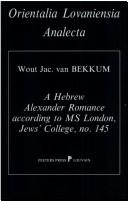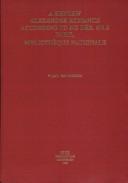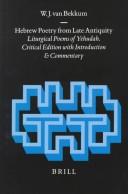| Listing 1 - 10 of 15 | << page >> |
Sort by
|

ISBN: 9068313959 9789068313956 Year: 1992 Volume: 47 Publisher: Leuven: Peeters,
Abstract | Keywords | Export | Availability | Bookmark
 Loading...
Loading...Choose an application
- Reference Manager
- EndNote
- RefWorks (Direct export to RefWorks)
Hebrew literature --- Hebreeuws --- Hébreu (langue) --- Legenden [Joodse ] --- Legends [Jewish ] --- Letterkunde der Oudheid --- Littérature de l'Antiquité --- Légendes juives --- Alexander, --- Academic collection --- Alexander the Great --- -Romances --- -Alexander --- Alexander der Große --- Alexandre le Grand --- Alejandro Magno --- Alexander de Grote --- Romances --- Alejandro, --- Alekjhāṇḍara, --- Aleksandar, --- Aleksander, --- Aleksandr, --- Alekʻsandre, --- Aleksandros bar Filipos, --- Aleksandŭr, Makedonski, --- Alessandro, --- Alexander --- Alexandre, --- Alexandros --- Alexandros, --- Alexandros, Megalos, --- Alexandru, --- Alexantros, --- Aleksandŭr, --- Александър, --- Iskandar, --- Maḳdonya, Aleksandros bar Filipos, --- Makedonski, Aleksandŭr, --- Македонски, Александър, --- Megalexandros, --- Megas Alexandros, --- Nagy Sándor, --- Sikandar, --- Iskender, --- Μέγας Ἀλέξανδρος, --- Ἀλέξανδρος, --- Ἀλέξανδρος --- אלכסנדר בן פיליפוס, --- אלכסנדר, --- اسكندر كبير --- اسکندر اعظم --- سکندراعظم --- Legends --- Volkenkundigen, taalkundigen --- Alexander, - the Great, - 356 BC-323 BC - Romances --- Alexander, - the Great, - 356 BC-323 BC

ISBN: 9072371623 Year: 1994 Volume: 1 Publisher: Groningen Styx
Abstract | Keywords | Export | Availability | Bookmark
 Loading...
Loading...Choose an application
- Reference Manager
- EndNote
- RefWorks (Direct export to RefWorks)

ISBN: 9004112162 900433243X 9789004112162 Year: 1998 Volume: 43 Publisher: Leiden: Brill,
Abstract | Keywords | Export | Availability | Bookmark
 Loading...
Loading...Choose an application
- Reference Manager
- EndNote
- RefWorks (Direct export to RefWorks)
The discovery of the Genizah manuscipt collection is nothing less than a revolution for the knowledge of Hebrew literature and Jewish culture in Late Antiquity and the Middle Ages. One of the main results of one hundred years of Genizah research is the rediscovery of Hebrew liturgical poetry which shed much light on various aspects of Jewish studies. For the last half century it has been almost comonplace to discover new poems, unknown poets, novel uses of poetry and unfamiliar poetic versions of familiar prose texts within liturgical settings being revealed among the manuscripts and manuscript fragments. The products of the composers and reciters of synagogue poetry convincingly demonstrate the importance of poetry in Jewish worship and communal life. The major corpora of Palestinian liturgical poetry bear evidence to the prolific literary activity of a number of famous poets who laid the foundations for the development of Hebrew poetry in later periods: Yossi ben Yossi, Yannai, Simon bar Megas, Elazar birabbi Kilir and Yohanan ha-Kohen. One of these mostly Byzantine-Jewish 'melodists' was Yehudah who composed a cycle of poems in accordance with the reading tradition of the Pentateuch and Prophets on the sabbath. This study presents Yehudah's oeuvre with commentaries and deals with its historical and literary context in four introductory chapters. The edition is complemented by indices and a bibliography.
Piyutim --- Yehudah --- Criticism and interpretation --- 892.4 --- Piyyutim --- Hebrew poetry, Medieval --- Hymns, Hebrew --- Jewish hymns --- Jewish religious poetry, Hebrew --- Judaism --- Hebreeuwse literatuur --- Liturgy --- -Criticism and interpretation --- 892.4 Hebreeuwse literatuur --- Jehuda, --- Yehudah, --- Criticism and interpretation. --- 892.4 Hebrew literature --- Hebrew literature --- Piyutim.
Periodical
ISSN: 13812564 Year: 1994 Publisher: Leiden Boston Styx ; Brill
Abstract | Keywords | Export | Availability | Bookmark
 Loading...
Loading...Choose an application
- Reference Manager
- EndNote
- RefWorks (Direct export to RefWorks)
Article
Abstract | Keywords | Export | Availability | Bookmark
 Loading...
Loading...Choose an application
- Reference Manager
- EndNote
- RefWorks (Direct export to RefWorks)
Article
Abstract | Keywords | Export | Availability | Bookmark
 Loading...
Loading...Choose an application
- Reference Manager
- EndNote
- RefWorks (Direct export to RefWorks)
Article
Abstract | Keywords | Export | Availability | Bookmark
 Loading...
Loading...Choose an application
- Reference Manager
- EndNote
- RefWorks (Direct export to RefWorks)
Book
ISBN: 9789004527003 9789004526990 Year: 2023 Publisher: Leiden ; Boston Brill
Abstract | Keywords | Export | Availability | Bookmark
 Loading...
Loading...Choose an application
- Reference Manager
- EndNote
- RefWorks (Direct export to RefWorks)
This is a comprehensive edition of Hebrew hymns composed by Eleazar the Babylonian, a prolific composer and scholar who lived in 13th-century Baghdad. His poetic language and style show much affinity with contemporary Sufism. This volume presents the reader with a fascinating collection of hymns composed by El'azar the Babylonian, an Arab-Jewish poet who is active in Baghdad during the first half of the 13th century. His religious oeuvre consists of dozens of hymns, coming down to us from the treasures of the Cairo Genizah and the Firkovicz Collections. His compositions provide a cross-section of genres and liturgical destinations. El'azar's devotional hymnology is characterised by a striking spiritual tendency which reveals his familiarity with contemporary Sufism in both Muslim and Jewish circles.
Jewish Mysticism --- Jewish Studies --- Literature & Linguistics --- Middle East and Islamic Studies --- Mysticism & Sufism
Book
ISBN: 9789004203815 9004203818 9789004203822 9004203826 1283121107 9786613121103 Year: 2011 Volume: 49 Publisher: Leiden Boston Brill
Abstract | Keywords | Export | Availability | Bookmark
 Loading...
Loading...Choose an application
- Reference Manager
- EndNote
- RefWorks (Direct export to RefWorks)
This volume contains fifteen essays in honor of Professor Joseph Yahalom who served as a lecturer at the Hebrew University from 1974 until he became full professor in 1985. The completion of his Warburg price awarded thesis in 1973 marked the start of a long and successful academic career in both Hebrew and Jewish studies, with much emphasis on poetry and poetics. Yahalom’s continuing interest in and research on ancient Piyyut led to a number of editions of Hebrew and Aramaic texts as well as to studies on the early Palestinian vocalization system and the language of Piyyut based on the Genizah findings. In 1983, Yahalom was elected a member of the Academy of the Hebrew Language. In 2003, he received the Yizhak Ben-Zvi award for his lifetime study of Jewish history and Hebrew literature. Yahalom’s research on Hebrew medieval liturgical poetry focused on a period of roughly one thousand years, from the days of early Byzantium until the final days of Jewish presence on the Iberian Peninsula and the Sephardic diaspora. His bibliography testifies to his expertise of understanding Hebrew verse, laying much emphasis on the interaction between the Jewish and surrounding cultures, which concur with Yahalom’s overall convictions and views about Jewish literature in context.
Hebrew literature --- Jewish literature --- 892.4 --- 296 "04/14" --- 296 <082> --- History and criticism. --- Hebreeuwse literatuur --- Judaïsme. Jodendom--Middeleeuwen --- Judaïsme. Jodendom--Feestbundels. Festschriften --- Festschrift - Libri Amicorum --- 892.4 Hebreeuwse literatuur --- History and criticism --- 892.4 Hebrew literature
Dissertation
ISBN: 9090020667 Year: 1988 Publisher: Groningen : s.n.,
Abstract | Keywords | Export | Availability | Bookmark
 Loading...
Loading...Choose an application
- Reference Manager
- EndNote
- RefWorks (Direct export to RefWorks)
Piyutim. --- Cairo Genizah. --- Yehudah, --- Hymnes hébraïques --- Manuscrits de la génizah du caire --- Piyyutim
| Listing 1 - 10 of 15 | << page >> |
Sort by
|

 Search
Search Feedback
Feedback About UniCat
About UniCat  Help
Help News
News